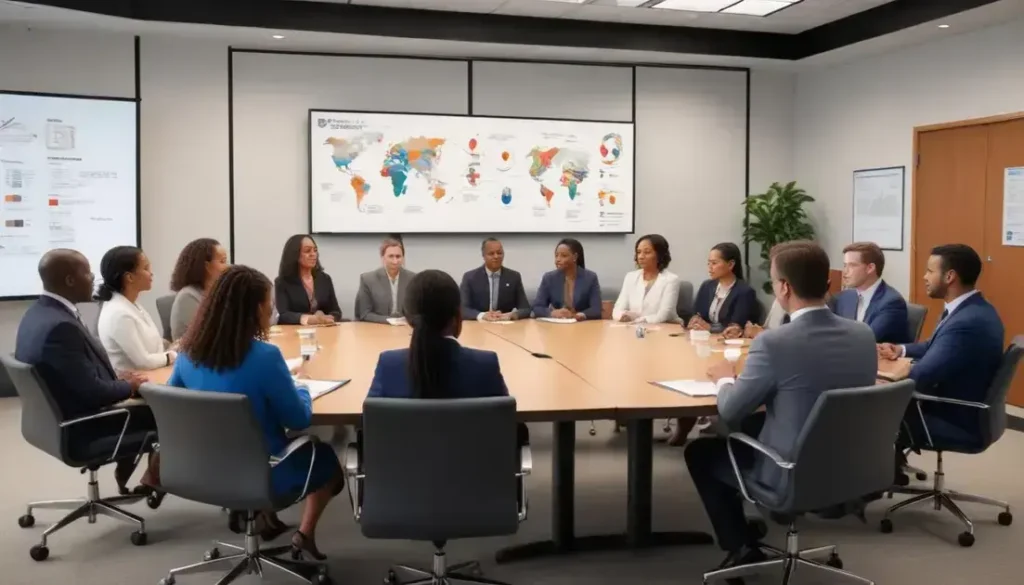Procurement 3.0 integrates advanced technologies like AI and sustainability practices, enhancing efficiency, supplier relationships, and data-driven decision-making within modern organisations.
In the evolving landscape of sustainability, Procurement 3.0 is reshaping how businesses operate. With growing pressures to integrate sustainable practices, organisations must adapt to new procurement strategies that emphasize efficiency and responsibility. Ready to explore how these changes can boost your business?
Introduction to Procurement 3.0
Procurement 3.0 signifies a crucial evolution in how organizations approach their supply chain strategies. At its core, this model emphasizes sustainability and responsible sourcing, aligning overall business strategies with environmental goals. By leveraging technology and advanced analytics, companies can enhance visibility throughout their supply chains, making informed decisions that benefit both the bottom line and the planet.
One of the essential components of Procurement 3.0 is the integration of Environmental, Social, and Governance (ESG) principles into procurement practices. This shift encourages businesses to consider the broader impact of their purchasing decisions, from ethical labour practices to minimising environmental footprints. As consumers increasingly demand responsible products, aligning procurement strategies with sustainability goals is no longer optional.
Additionally, the proliferation of data enables organizations to optimise their procurement processes. By harnessing AI and machine learning, businesses can predict trends, assess supplier performance, and identify new opportunities for cost savings. This data-driven approach not only enhances efficiency but also fosters innovation within procurement teams.
As companies transition to Procurement 3.0, it is critical to develop a culture of collaboration among departments. Breaking down silos ensures that every team member understands their role in achieving sustainability objectives, driving total organisational commitment to these initiatives.
AI’s Role in Sustainable Procurement
The role of Artificial Intelligence (AI) in sustainable procurement is pivotal in modern business practices. By automating routine tasks, AI enhances efficiency and accuracy, allowing procurement teams to focus on strategic decision-making. This technology facilitates the analysis of vast amounts of data, enabling organisations to identify sustainable suppliers and optimise their supply chains.
AI algorithms can assess supplier compliance with environmental standards and social responsibility guidelines. This ensures that businesses partner with vendors who align with their sustainability goals. Additionally, predictive analytics powered by AI can forecast demand, reducing waste and improving resource management.
Furthermore, AI assists in improving transparency within supply chains. By using blockchain technology, organisations can track the provenance of their products, ensuring ethical sourcing. This builds trust with consumers who are increasingly concerned about the sustainability of their purchases.
As organisations advance in their sustainability journeys, AI can also provide insights into potential risks and challenges in their procurement processes. By employing machine learning, companies can continuously improve their sustainability practices, ultimately ensuring a positive impact on both the environment and their bottom lines.
Key Elements of Procurement 3.0
The concept of Procurement 3.0 encompasses several key elements that drive efficiency and sustainability in supply chain management. One fundamental aspect is the integration of technology, which enables real-time data visibility and enhances decision-making processes. Organisations increasingly rely on advanced analytics to monitor supplier performance and assess risks associated with their procurement strategies.
Another crucial component is the focus on sustainable sourcing. This involves selecting suppliers that adhere to environmental and social governance standards, ensuring that procurement practices contribute positively to the planet and society. Implementing sustainable practices not only meets regulatory requirements but also aligns with consumer expectations for ethical products.
Collaboration across departments is essential in Procurement 3.0. By breaking down silos, companies can foster communication between procurement, finance, and sustainability teams. This integration ensures that all members are aligned with the organisation’s sustainability goals and can collectively develop innovative solutions.
Furthermore, embracing innovation is imperative for businesses wanting to stay competitive. Procurement 3.0 encourages organisations to explore new technologies, such as AI and blockchain, which streamline operations and enhance transparency in the supply chain. Adopting these elements can lead to increased operational effectiveness and a more resilient procurement strategy.
Challenges in Traditional Procurement
Traditional procurement faces numerous challenges that can hinder efficiency and effectiveness in supply chain management. One significant issue is the reliance on outdated processes that often lack the agility needed to respond to market changes. These processes can create bottlenecks, delaying decision-making and impacting overall business performance.
Another challenge involves data silos. Many organisations struggle with fragmented information stored across different departments, making it difficult to obtain a complete view of supplier performance and procurement efficiency. This lack of visibility can result in missed opportunities for cost savings and sustainable sourcing.
Moreover, procurement teams often grapple with supplier relationships that are not optimised for collaboration. Traditional models tend to view suppliers as mere vendors rather than partners. This mindset limits innovation and can prevent organisations from fully leveraging the capabilities of their suppliers.
Finally, compliance and risk management are critical concerns. Traditional procurement methods may not adequately address the complexities of regulatory requirements or the need for comprehensive risk assessments. Without robust processes in place, organisations may expose themselves to reputational damage and operational disruptions.
Data Silos and Visibility Gaps
Data silos present a significant challenge in the realm of procurement, leading to critical visibility gaps that can hinder effective decision-making. When information is stored in isolated systems, it creates barriers that prevent departments from accessing vital data. This lack of integration often results in inefficiencies, as teams struggle to share insights and collaborate on procurement strategies.
Moreover, these silos can obscure a comprehensive view of supplier performance and compliance. Without a holistic understanding, organisations may fail to identify risks or opportunities within their supply chains. Consequently, procurement professionals may rely on outdated information, which can lead to poor purchasing decisions and wasted resources.
Addressing visibility gaps is essential for strengthening procurement processes. Implementing integrated data management systems is one effective solution. These systems facilitate real-time access to information, enabling teams to make informed decisions based on accurate data. Additionally, leveraging advanced analytics can provide deeper insights, helping organisations to forecast demand and plan their purchasing activities more effectively.
Ultimately, breaking down data silos fosters a culture of transparency and collaboration within procurement teams. By promoting open communication and ensuring that all stakeholders have access to critical information, companies can enhance their agility and responsiveness in a rapidly changing market.
Integrating ESG into Procurement Strategies
Integrating Environmental, Social, and Governance (ESG) criteria into procurement strategies is essential for organisations aiming to enhance their sustainability efforts. This integration involves selecting suppliers who align with ESG principles, thus promoting responsible sourcing practices. By prioritising suppliers with strong sustainability credentials, businesses can reduce their ecological footprints and contribute positively to social welfare.
One effective approach is to establish clear ESG criteria during the supplier selection process. These criteria should encompass environmental impact assessments, social responsibility policies, and governance practices. This ensures that procurement decisions are not solely based on cost, but also consider long-term relationships with suppliers committed to ethical practices.
Furthermore, robust monitoring and reporting mechanisms should be developed to track the ESG performance of suppliers. This may involve regular audits and performance reviews, allowing organisations to ensure compliance with their sustainability goals continuously. Regular communication with suppliers also fosters collaboration, encouraging continuous improvement in sustainability practices.
Integrating ESG into procurement not only enhances brand reputation but also mitigates risks associated with regulatory compliance and consumer expectations. As stakeholders increasingly demand transparency and accountability, organisations that embrace ESG principles within their procurement strategies will likely achieve a competitive advantage in the marketplace.
Collaboration Across Departments
Collaboration across departments is a vital component of modern procurement strategies, driving efficiency and innovation. When procurement teams work closely with other departments such as finance, production, and sustainability, they can align their objectives and share valuable insights. This interdisciplinary approach fosters a culture of collaboration that enhances decision-making and problem-solving capabilities.
One key benefit of interdepartmental collaboration is the ability to leverage diverse expertise. For instance, finance teams can provide critical insights into budgeting and cost management, while sustainability teams can guide procurement in selecting eco-friendly supplies. This synergy ensures that procurement decisions not only meet economic objectives but also support broader corporate sustainability goals.
Effective communication is essential for successful collaboration. Establishing regular meetings and collaborative platforms can facilitate the exchange of ideas and updates. Teams should also implement shared performance metrics that reflect the collective goals of the organisation. By doing so, all departments can work towards a common purpose, improving overall organisational performance.
Moreover, cross-functional collaboration can lead to innovation in procurement processes. By encouraging teams to brainstorm and experiment with new ideas, organisations can identify innovative solutions that drive efficiency and effectiveness in the supply chain, ultimately delivering added value.
Real-Life Case Study: Northwestern Mutual
The real-life case study of Northwestern Mutual illustrates the profound impact of modern procurement practices on business outcomes. Northwestern Mutual, a leading financial services provider, has embraced innovative procurement strategies to enhance operational efficiency and drive value creation. By leveraging advanced technologies, such as data analytics and AI, the company has transformed its procurement processes significantly.
One of the key initiatives involved implementing a comprehensive supplier relationship management system. This system allows Northwestern Mutual to evaluate supplier performance effectively, ensuring alignment with the company’s strategic goals. By establishing clear metrics for success, they have been able to foster stronger partnerships with their suppliers, driving mutual growth.
Additionally, Northwestern Mutual prioritises sustainability in its procurement decisions. The company focuses on sourcing materials and services from suppliers that adhere to strict environmental standards. This not only enhances the company’s reputation but also aligns with its corporate responsibility objectives, demonstrating a commitment to ethical practices.
The positive outcomes from these initiatives are evident in the measurable improvements in cost savings and efficiency. By adopting a strategic approach to procurement, Northwestern Mutual has successfully navigated market challenges while continuing to deliver exceptional service to its customers.
Impact of AI on Procurement Roles
The impact of Artificial Intelligence (AI) on procurement roles is profound, reshaping how procurement professionals operate within organisations. As AI technologies advance, they automate routine tasks, enabling procurement teams to focus on more strategic initiatives. This shift allows procurement professionals to concentrate on building relationships with suppliers, negotiating contracts, and developing sustainable sourcing strategies.
AI-powered tools streamline procurement processes by enhancing data analysis capabilities. Procurement teams can leverage AI to gather and analyse vast amounts of data, providing insights into supplier performance and market trends. These insights facilitate informed decision-making, allowing organisations to respond proactively to changes in the supply chain.
Moreover, AI aids in managing supplier relationships. By utilising AI-driven analytics, procurement professionals can identify and address potential risks within the supply chain, ensuring a more resilient procurement strategy. This proactive management helps mitigate disruptions and enhances overall supply chain reliability.
As AI continues to evolve, the roles within procurement will likely adapt further. Professionals will need to embrace new skill sets, including data literacy and change management. Training and development initiatives will become vital to equip teams with the necessary skills to navigate the evolving landscape of procurement enriched by AI technologies.
Future Trends in Procurement
The future of procurement is set to be significantly influenced by advancements in technology and evolving market demands. One of the prominent trends is the increasing reliance on digital transformation. Organisations are integrating advanced technologies such as AI, machine learning, and blockchain into their procurement processes. These technologies enhance efficiency, improve data transparency, and enable real-time decision-making.
Another critical trend is the focus on sustainability and ethical sourcing. As consumers and stakeholders become more environmentally conscious, businesses are prioritising sustainable practices in their procurement strategies. This shift includes sourcing from suppliers who adhere to strict environmental and social governance standards.
The rise of data analytics is also transforming procurement. By leveraging big data, organisations can gain deep insights into supplier performance, market trends, and customer behaviour. This data-driven approach empowers procurement teams to make informed decisions and optimise supply chains effectively.
Collaboration will play an increasingly vital role in procurement. Cross-functional teams within organisations will work together to align procurement strategies with broader business objectives. This collaborative approach will drive innovation and enhance the overall effectiveness of procurement functions.
Conclusion and Key Takeaways
The evolution of procurement, especially with the integration of AI and sustainability practices, is reshaping the landscape for businesses worldwide. By adopting innovative technologies, procurement professionals are now equipped to make data-driven decisions that drive efficiency and reduce costs.
Importantly, collaboration across various departments is becoming essential. Procurement teams must work closely with finance, operations, and sustainability teams to align their strategies with broader business objectives. This collaborative approach enhances the overall effectiveness and resilience of the supply chain.
Moreover, organisations are increasingly recognising the significance of ethical sourcing and supplier relationships. By prioritising suppliers that adhere to environmental and social governance standards, companies can enhance their brand reputation while contributing positively to society.
As procurement continues to evolve, professionals must be prepared to adapt to emerging trends. Staying updated with technological advancements and developing new skills will be crucial in navigating the future. By embracing change and fostering innovation, procurement can play a pivotal role in achieving strategic business goals.
In Summary
The role of procurement is more important than ever, especially with the rise of new technologies like Artificial Intelligence (AI) and a focus on sustainability. By integrating these advancements, businesses can work more efficiently, save costs, and build stronger supplier relationships.
Collaboration between departments will help create a unified approach to meet business goals. It encourages teams to share insights and make informed decisions. This teamwork is essential for adapting to change in today’s fast-paced environment.
Moreover, prioritising ethical sourcing not only enhances a company’s image but also contributes to a better society and environment. Companies that value these principles stand out and attract more customers.
As the future of procurement unfolds, professionals must stay updated with the latest trends and continue to develop new skills. Embracing these changes will enable procurement to play a critical role in driving business success.
Frequently Asked Questions
How can AI improve procurement processes?
AI can automate routine tasks, analyse large data sets, and provide insights to enhance decision-making and efficiency in procurement.
What role does sustainability play in modern procurement?
Sustainability is crucial as it encourages businesses to source ethically and minimise environmental impact, which attracts conscious consumers.
How can collaboration between departments benefit procurement?
Collaboration allows for a sharing of insights and resources, ensuring that procurement strategies align with overall business goals and enhance effectiveness.
What technologies are essential for the future of procurement?
Key technologies include AI, big data analytics, and blockchain, which streamline processes and improve transparency in the supply chain.
Why is supplier relationship management important?
Effective supplier relationship management fosters stronger partnerships, encourages collaboration, and helps mitigate risks associated with the supply chain.
What skills will procurement professionals need in the future?
Future procurement professionals will need data literacy, adaptability, communication skills, and a strong understanding of technology to thrive in an evolving landscape.


